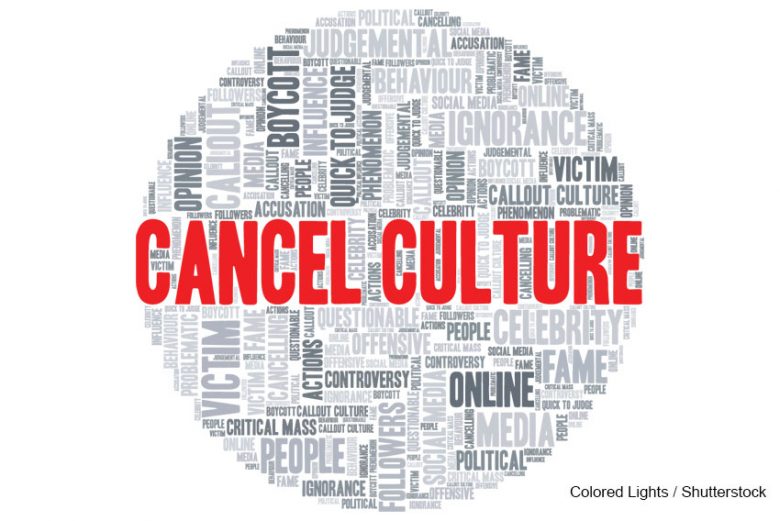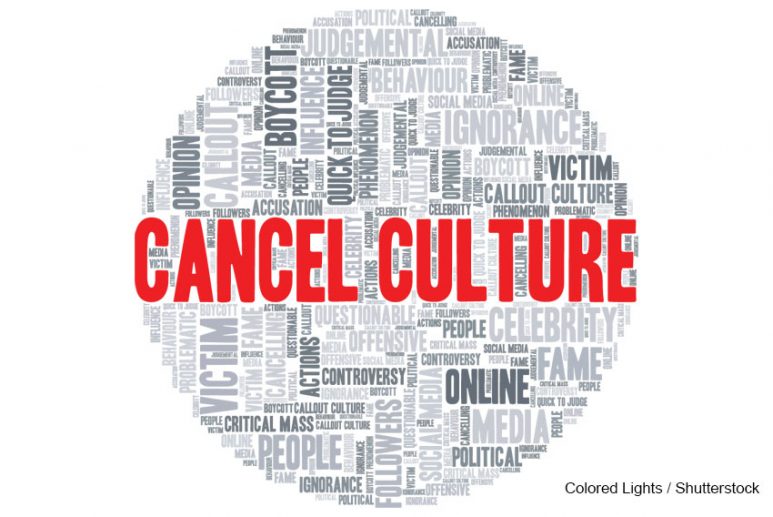By Mikhail Yakovlev
Download now the PDF Booklet of Media Diversity Institute’s Cancel Culture Series
On 13th June this year, a new satellite channel launched in the UK. Its self-described mission? To give a voice to the silent majority who, according to its Chairman Andrew Neil, have been ‘cancelled’ by elite media and their ‘woke’ agenda. If this sounds remarkably similar to the incoherent anti-media messaging that used to come from Donald Trump’s ‘cancelled’ Twitter account, this is because it is.

Unfortunately, this silenced majority has not come through. According to the clickbait title of a review in The Guardian, “GB News launch gains more viewers than BBC or Sky news channels”. But, when these figures are broken down in the very same article, they are far less impressive. During the 19:00 to 23:00 slot on the day of the big launch, GB News received 1.1% of audience share, compared to BBC News Channel’s 0.9% and Sky News’s 0.4%. But, BBC 1’s flagship ‘News at Ten’ attracted an altogether more impressive 30.6% of the audience. Since then, GB News ratings have plunged altogether, reaching 0 after the Channel’s boycott of taking the knee.
The Great British News flop points to the confusing place of ‘cancel culture’, in our increasingly confusing world. While right-wing media and Twitter ‘personallities’ accuse mainstream media and social media companies of complicity in woke ‘cancel culture’, it is the most marginalised voices that remain silenced in conventional and social media.
At the same time, it is important not to downplay legitimate concerns about freedom of speech and toxic mob take-downs, such as doxxing, especially prevalent on some social media like WeChat. Unfortunately, it is precisely these complex and muddy dynamics that render ‘cancel culture’ such a confusing phenomenon and term. To get to the bottom of things, Media Diversity Institute (MDI) asked six academics, writers, and activists one major question – what is ‘cancel culture’ and who/what is threatened by it?
The Cancel Culture Series of interviews will be published during the first week of August 2021.
Cancel Culture Series: Interview with Dr Angela Martinez Dy
Cancel Culture Series: Interview with Jillian C. York
Cancel Culture Series: Interview with Benjamin Cohen
Cancel Culture Series: Interview with Eric Heinze
Cancel Culture Series: Interview with Charlotte Galpin
Cancel Culture Series: Interview with Frankie Morgan
Download now the PDF Booklet of Media Diversity Institute’s Cancel Culture Series
Eric Heinze (he/him) is an Author & Professor of Law and Humanities, Queen Mary University London. Twitter: @Eric_Heinze_ Latest book: Hate Speech and Democratic Citizenship
Nowadays, this phrase ‘cancel culture’ is being thrown into all sorts of situations. Within academia, it has also known as ‘no platforming’, which pretty much denotes the same thing. It stands broadly for the idea that certain ideas are too offensive, or too provocative, or too dangerous to make a legitimate contribution to public discussion.
The assumption is that simply lending a platform to an idea, in which it can be aired and discussed, legitimises it. Of course, you can debate that proposition. For example, there is plenty of teaching of Nazism. But, I do not think that any teaching of Nazism in the West is designed to lend it legitimacy. When speakers are disinvited, ‘cancelled’, or have the platform withdrawn from them, it is because they are advocating certain ideas, as opposed to treating those ideas critically. Nobody objects to teaching Nazism because the assumption is that the teaching is critical throughout.
The outcome is that plenty of dangerous ideas can be discussed as long as they are being categorically rejected. But is that always sufficient?
To take one example, debates around transgender identity have been raging for the last few years. Some speakers who adhere to the so-called radical feminist view have been ‘cancelled’, disinvited. For those who adhere to this position or want to hear different arguments about the issue, this feels like unwarranted censorship. Within the academic community, that kind of censorship will inhibit open debate and research.
There are people who make the argument that, in the UK at least, universities are self-governing bodies that should be able to decide whom to invite, based on majority-opinion. But, in my own writing, I distinguish between democracy and majority sentiment. Democracy is not always a head count. There are all sorts of ideas that majorities do not like and, in many ways, majoritarianism can undermine democracy. You can take a majority vote after all opinions have been aired but if you simply exclude speakers because the majority doesn’t want to hear them, then you undermine democracy. It becomes antithetical to democracy if the majority can silence minorities. Minorities have always been a part of democracy and that includes minority opinions.
Universities have a public service function in protecting diversity. The problem is that if we allow speech against certain minority groups, it serves to exclude them. I think this is certainly true in non-democracies, where hateful speech can be detrimental to minority interests. Whether that’s true in a democracy is a far more complicated question. This is why I disagree with ‘no platforming’ or so-called cancelling.
In a democratic framework, what matters is how the conversation is structured. Again, I write a lot about this in my book. The key factor for me is not the content of speech. If you want to have controversial speakers, you should not decide whether to invite them based on their opinions. Rather the question should be – how is the conversation structured?
Above all, my argument is that every member of the campus community must have access to the discussion. If you are going to use a university campus, which is usually state-funded in Western Europe, then everyone in the campus community should be notified. Everybody should have the option to attend and there should always be opportunities for cross-examination. This should not be hard because most academic conferences are already structured this way.
Nevertheless, in the past, we have sometimes had problems with hate preachers, who were invited to speak but nobody knew about the invitation. It wasn’t always clear who had done the inviting, and the campus community was never notified. Again, the response was simply to ban hate preachers – to look at the content. This is not the way to do it. Allow them to come, but ensure that their talk is properly advertised and everyone has the opportunity for genuine participation and questioning. If it is done that way, a lot of them will just not come. They will censor themselves. And, if they do come then they can be challenged about their views. Take another example. It’s very rare to see high corporate executives, in particular from companies like Monsanto or Lockheed Martin, companies that do controversial things, speak at university campuses. I am sure they would love to do so, but as long as they know they may be cross-examined about their corporate conduct, they prefer to stay away entirely.
Photo Credits: Colored Lights / Shutterstock

